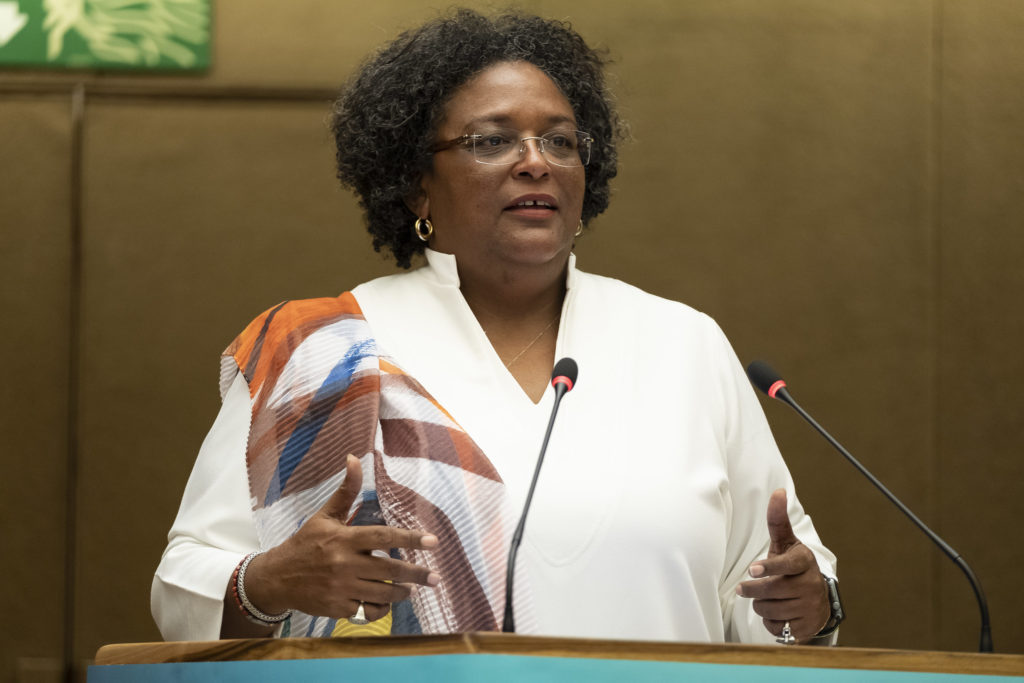Prime Minister of Barbados lays out her vision for the future of SIDS

The Hon. Mia Amor Mottley, Prime Minister of Barbados, delivered the keynote address at the recent Alliance of Small Island States (AOSIS) 30th anniversary event, ‘A SIDS Moment in December’, where she shared her vision for the next decade for small island developing states (SIDS).
Reflecting on the challenges posed by Covid-19 and the difficulties SIDS have faced this year, she cautioned that climate action could not rest, commenting: “Whilst we can look forward to highly efficacious vaccines for Covid-19 in the new year, there is no vaccine available against the climate crisis.”
She laid out her vision for the future and steps SIDS and others need to take to get there.
Leading the way on climate action
Reflecting on the increased role SIDS need to play in pushing for climate action, Prime Minister Mottley asked her audience “to imagine a world where the large, powerful countries and, increasingly, the multinational corporations did not dictate all of the rules, a world where small islands were not considered dispensable [but] were indeed visible. That is the future that we demand.”
She noted the successes that the 44 SIDS that make up AOSIS have thus far achieved, including pushing for 1.5 degrees, rather than 2 degrees, as a guardrail for global warming limits; lobbying that generated the Intergovernmental Panel on Climate Change’s Special Report on 1.5 degrees; and leading the world in ocean conservation and the concept of a ‘blue economy’.
Engaging the climate crisis on multiple fronts
Looking to the future and the survival of SIDS, Prime Minister Mottley commented: “The challenges we face as small islands force us to re-think…how best we can ensure our very existence. Perhaps AOSIS should now engage the climate crisis on multiple fronts, in addition to within the designated United Nations silos.”
She described climate change as both a human rights issue and a national security issue and argued that most aspects of SIDS’ foreign policies and trade relations should therefore be influenced by the existential threat that climate change has posed.
Moving forward, she recommended that SIDS need to:
- Strengthen internal capacities to generate and interpret their own climate data, and to provide scientific evidence to their own policymakers and negotiators.
- Strengthen dissemination of best practice among SIDS.
She impressed that “…for too long we’ve spoken about a small island developing states network and the synergies and economies of scale that could be obtained by joint approaches to, for example, sourcing climate finance” without actually taking practical steps to do this, suggesting that now is the time to take more collective action.
Actions for developing countries
The Prime Minister outlined urgent actions needed from developing countries, especially in the context of the Covid-19 pandemic.
She argued that debt problems, especially those of developing countries, must be addressed as soon as possible in order to prepare for an equitable, resilient, greener and sustainable economic and social recovery from Covid-19.
She also made the case for integrating vulnerability into development financing, noting that SIDS have been consistently calling on the international community to do this, and for changing the development financing landscape for small states to incorporate a universal vulnerability index.
“Many of our development partners are failing to live up to promises made under Monterrey Consensus, and failing to provide climate finance that was promised under the United Nations Framework Convention on Climate Change and then under the Paris Agreement,” she commented.
“It is extremely unfortunate that due to the pandemic, scheduled negotiations have not commenced this year on a new collective finance goal for 2025 – we need urgent action. We commend the efforts to date of the G20 countries, the UN and the International Monetary Fund and World Bank.
“Much more is needed and much more quickly – we need fresh approaches and new thinking, and that is why Barbados has volunteered to be the smallest nation to ever host the meeting of the United Nations conference on trade and development.
“There is much work to be done, and our survival as small island developing states depends on it.”
Raising SIDS’ visibility
“The most vulnerable among us must have a seat at the table when major policy options are being negotiated. For too long our voices have not been heard,” the Prime Minister commented.
“We may be invisible to some but…we are certainly not indispensable.”
She urged that now more than ever SIDS need the financial architecture and governance mechanisms to drive a global plan to prevent vulnerable counties from spiralling into ever-increasing debt, and to mount a green recovery to avert the climate crisis.
‘The great reset’
Prime Minister Mottley closed her address by asking SIDS: What type of future do we want and are we capable of creating?
She framed the Covid-19 pandemic as an unprecedented opportunity to reset and choose a more sustainable path, commenting: “Let us make sure that no island is left behind in the great reset. Now is the time to regain our respect for science and our humility towards mother nature.
“As the custodians of some of the most diverse ecosystems in the world…we have a unique perspective and the ability to lead the world into a truly enlightened future.”
Watch Prime Minister Mottley’s full address here. You can watch the full event proceedings from the ‘A SIDS Moment in December’ event here.
Image: The Honorable Mia Amor Mottley, Prime Minister of Barbados, speaks at the 16th Raúl Prebisch Lecture held in Geneva, Switzerland, on 10 September. Credit Timothy Sullivan (UNCTAD).